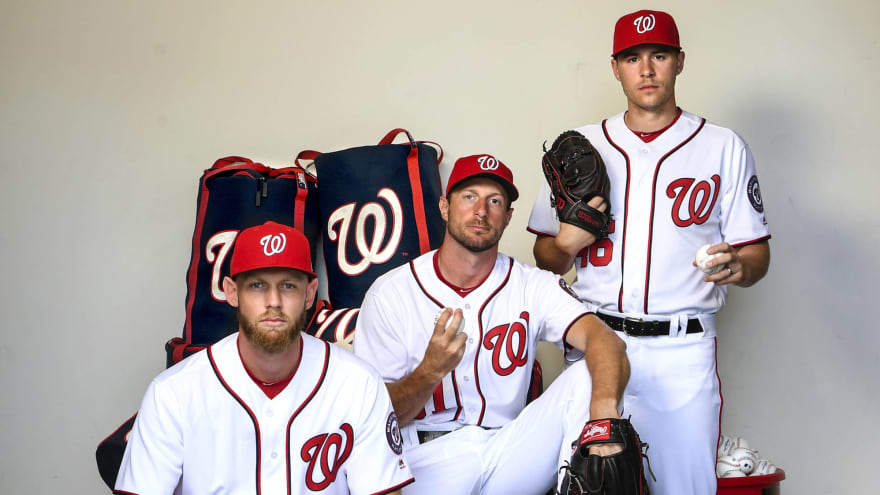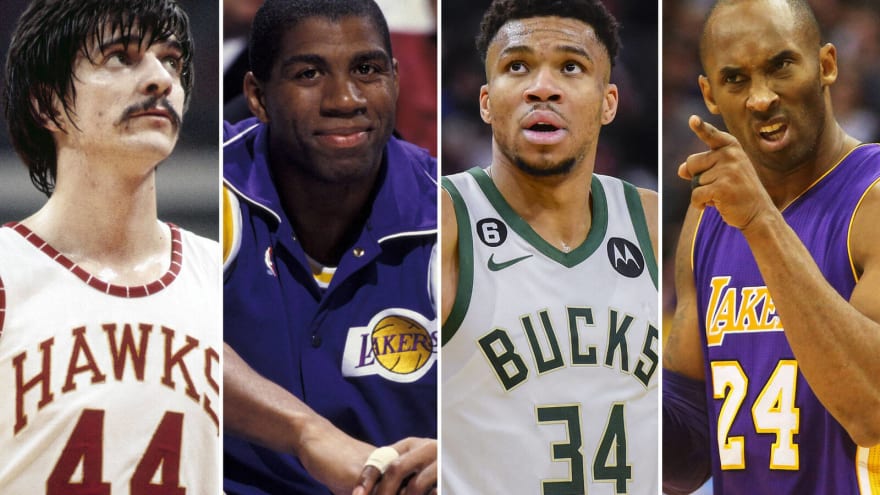
MLB reveals flimsy 'Rivalry Weekend' for 2025 schedule, fumbling a good idea
There are multiple ways to define a rivalry, especially in sports. But, mostly, they're pretty clear-cut unless you ask MLB.
On Thursday, the league announced a special "Rivalry Weekend" for the 2025 schedule, which will take place from May 16-18. However, some of the matchups are curious at best.
For starters, perhaps the ultimate sports rivalry between the New York Yankees and Boston Red Sox isn't among the featured contests. Neither are the Los Angeles Dodgers vs. San Francisco Giants nor the Chicago Cubs vs. St. Louis Cardinals.
MLB will have a "Rivalry Week" in 2025, during which all fifteen series matchups will feature some form of rivalry -- geographical (NY/NY, LA/LA etc), historical (Bos/Atl), or the last two left without a lab partner (Sea/SD) pic.twitter.com/oV5SuGcmmZ
— SportsLogos.Net (@sportslogosnet) July 18, 2024
Instead, MLB decided to go geographical when determining which bitter enemies would face off. Out of the 15 matchups, the majority of games are between teams that reside relatively close to one another, regardless of the history that exists.
It works in some instances. For example, pairing the Chicago Cubs and Chicago White Sox is never a terrible idea. But too many contests are flimsy attempts at creating a rivalry that simply isn't there or has long since evaporated.
The Philadelphia Phillies and Pittsburgh Pirates were once rivals. However, since the National League broke into three divisions in 1993, any ill-will has blown away in the winds of time.
Meanwhile, MLB made a few more curious choices.
Much like the Phillies and Pirates, neighbors in the Washington Nationals and Baltimore Orioles will battle. With time, this could brew into a decent rivalry, but for now, the only beef, again, is proximity.
Similarly baffling, the Boston Red Sox will play the Atlanta Braves. While it's true that the Braves used to play in Boston, they moved to Milwaukee in 1952, and the two sides have only met 96 times (never in the postseason), with the first coming when baseball introduced interleague play in 1997.
Perhaps MLB consciously decided to organize its rivalry weekend in the most efficient way possible. In fairness, the logistics of planning a 162-game schedule must have made matching rivals difficult.
However, passing over the obvious ones was a major miss for baseball and its fans. If next year's event is something the league wants to carry on into the future, perhaps it will showcase more actual rivalries in 2026.
More must-reads:
- Is MLB any closer to expansion after Rays stadium approval?
- Five MLB players who must be better in second half of the season
- The '2024 Major League Baseball All-Stars' quiz
Breaking News
Trending News
TODAY'S BEST

Brewers righty deserves consideration as dark-horse Cy Young candidate
The Milwaukee Brewers' trade with the Boston Red Sox early in the season flew under the radar. The Brewers acquired former top prospect Quinn Priester from the Red Sox, sending outfield prospect Yophery Rodriguez to Boston on April 7. Pitching prospect John Holobetz was sent to the Red Sox on May 5 to complete the trade. Priester had been expected to be a top-of-the-rotation arm, lauded for his athleticism and plus fastball and curve. However, he struggled during his time in the majors in 2023 and 2024, posting a combined 6.23 ERA and a 1.555 WHiP over 99.2 innings, striking out 69 batters with 41 walks while serving up 19 home runs. Despite a solid outing in his only appearance for the Red Sox, Priester remained in Triple-A as nothing more than pitching depth. That changed with his arrival in Milwaukee. He has exceeded expectations, either as a traditional starter or following an opener. Priester has posted a 3.15 ERA and a 1.190 WHiP over his 114.1 innings for the Brewers, striking out 93 batters with 38 walks. Opponents have mustered a meager .228/.294/.382 batting line in 471 plate appearances with just 13 homers. The Brewers' 64-48 record entering Tuesday is the best in the majors despite a nondescript rotation. While Freddy Peralta is a top-of-the-rotation arm in his own right, staff ace Brandon Woodruff missed all of 2024 and most of the first half of 2025. Pitchers such as Chad Patrick, Tobias Myers and Jose Quintana are back-of-the-rotation arms at this point. The Brewers needed someone to step up with Priester being the unlikely hero. Pitchers Paul Skenes and Zack Wheeler are the prohibitive favorites to win the National League Cy Young Award. BetMGM does not have Priester listed as one of the 10 most likely candidates to take home the hardware. However, Priester's performance, coupled with the Brewers' success this season, is worthy of attention. If he can continue to perform at this level, Priester deserves at least some consideration on the ballot.

Vikings offense has sizable hole following first-round WR's NFL ruling
The Minnesota Vikings will be without one of their top wide receivers for the start of the regular season. On Tuesday, wideout Jordan Addison was suspended without pay for the season's first three games after pleading no contest earlier this offseason to a "wet reckless" charge. He was initially charged with DUI on July 12, 2024 and pleaded not guilty to those counts on Dec. 3, 2024. In July 2023, he was also cited for speeding a reckless driving when going 140 mph in a 55 mph zone. During his first two seasons, Addison, a 2023 first-round pick (No. 23 overall), has 133 receptions, 1,786 receiving yards (13.4 yards per reception) and 19 touchdowns. During that span, only Cincinnati Bengals wide receiver Ja'Marr Chase, Tampa Bay Buccaneers wide receiver Mike Evans and Detroit Lions wide receiver Amon-Ra St. Brown have more receiving touchdowns. His absence is a blow to the Vikings offense, entering its first season with 2024 first-round pick J.J. McCarthy as the starting quarterback. While McCarthy will still have arguably the NFL's best wide receiver, Justin Jefferson, to throw to during the season's first three weeks, Addison's suspension severely compromises the team's depth. Jalen Nailor, a 2022 sixth-rounder, should be in line for an increase in playing time. Last season, he played a career-high 51 percent of his available offensive snaps, via Pro Football Reference. Offseason free-agent signings Rondale Moore and Tim Jones, 2025 third-round pick Tai Felton and undrafted free agents Lucky Jackson and Silas Bolden could also be forced into more prominent roles. Last season, Moore missed the entire year after suffering a training-camp knee injury with the Atlanta Falcons, while Jones had just three receptions on five targets for the Jacksonville Jaguars. Felton and Bolden are rookies and might not be ready for heavy workloads, while Jackson is possibly having the best training camp of the group, recently making impressive plays on back-to-back days. Regardless of who takes Addison's snaps, the Vikings offense won't be at full strength to begin the season. Opponents will be able to focus their attention on Jefferson with double-teams and force Minnesota's unproven secondary and tertiary options to beat them. It's not an ideal set of circumstances for McCarthy as he preps for his regular-season debut, but the Vikings have no other choice than to make it work.

NBA Insider: Russell Westbrook, Jonathan Kuminga Could Join New Team Together
The potential landing spots for both nine-time NBA All-Star Russell Westbrook and Golden State Warriors forward Jonathan Kuminga are perhaps the most pressing questions remaining this offseason. According to the latest report from two Sacramento Kings insiders, the pair could wind up joining forces in Sacramento this upcoming season. On Tuesday's edition of "The Dave Carmichael Show" on Sactown 1140am, Carmichael and co-host Jason Ross went as far as suggesting that Westbrook and Kuminga will likely have to be a package deal if Sacramento were to pursue either player. Kuminga and Westbrook to the Kings? Dave: "We do know this for the Westbrook thing to happen, the Kuminga thing would almost definitely have to happen. Ross: "I mean, so let's say Kuminga doesn't, then is that an off the table thing for us? Because, I mean you're already crowded in the backcourt, you wouldn't have lost a guard and now you'd be adding another one." Dave: "I think it is. I do. I think it is. Unless they found another deal. Is it, this is a deal we know about." Previous reports this weekend indicated that the Kings viewed a possible haul of Westbrook and Kuminga as a dream offseason. Golden State may have thrown a wrench in Sacramento's plans for Kuminga, however, as the team has reportedly shut down all sign-and-trade talks surrounding the 22-year-old forward and will instead look to keep him on the roster for next season. ESPN's Marc Stein reported last week that Kuminga preferred a move to Sacramento opposed to a return to Golden State after the Kings promised him a spot in the starting lineup. Kuminga saw a diminished role down the stretch of last season, largely due to a highly publicized mismatch between himself and coach Steve Kerr. "He wants to go," Stein said. "And the Kings are offering a starting spot. Power forward, next to Keegan Murray, next to Sabonis. He's talked on a Zoom call with Scott Perry, as you know, the GM, BJ Armstrong, the assistant GM, and also with their head coach. So he's in. He wants to go there. While Kuminga clearly desires an exit from Golden State, Stein also indicated that the Warriors aren't exactly jumping at the compensation offered by either Sacramento or Phoenix, the other frontrunner in the Kuminga sweepstakes. "But I think that first (round pick), the Warriors don't like the first. And then the Suns, I heard they're like offering Royce O'Neal in four seconds and Nick Richards. That's just not pretty enough."

Basketball World Reacts To Boston Celtics Signing Former NBA Champion
On Tuesday afternoon, ESPN's Shams Charania reported the news that the Boston Celtics were signing Chris Boucher. The two-time NBA Champion had spent the last seven years playing for the Toronto Raptors. Via Charania: "Chris Boucher lands a guaranteed deal with the Celtics and is expected to have a significant role in the frontcourt. Boucher departs Toronto where he has the all-time franchise record in points, rebounds, blocks, minutes and games played off the bench. He also was the Raptors' last remaining member of the 2019 NBA championship team." StatMuse: "Chris Boucher as a Raptor: — 1st in bench points — 1st in bench rebounds — 1st in bench blocks — 1st in bench stocks — 1st in bench threes — 1st in bench free throws — 1st in bench wins — 1st in bench double-doubles Going to Boston." @OmerOsman200: "The way Chris Boucher was treated the last 2-3 years, I’ll never forget. 2x champ got so disrespected by the front office. Mad respect to his patience and professionalism. I wish nothing but the best for CB25. Real ones will forever love him." @lucarosano3: "With Chris Boucher heading to the Celtics, there are officially no more players remaining from the Raptors 2019 championship team." Noa Dalzell: "The Celtics sign Chris Boucher (per Shams) who averaged 10 points on 49.2% shooting last season with the Raptors. Shot 36.3% from three. Intriguing frontcourt signing for only $3.3 million!" Keith Smith: "RJ Luis is signed to a two-year two-way contract. He’ll fill the Celtics open two-way spot. Boston’s other two current two-way players are Miles Norris and rookie Max Shulga. Chris Boucher will be on a vet minimum deal and will fill the spot opened up by trading Georges Niang to Utah. Boston has one open roster spot and is about $7.8M under the second apron." Bobby Manning: "Chris Boucher is 33 this year, 9th season. 10.0 PPG 4.5 RPG 0.7 APG 0.5 SPG 0.5 BPG 49.2% FG 36.3% 3PT 78.2% FT. Wing/big combo who gives them some much-needed F/C lineup flexibility. Still think Queta starts, but he's a possibility now." The Celtics lost to the New York Knicks in the second round of the 2025 NBA playoffs. Via NBA Retweet: "The Boston Celtics potential lineup next season: PG: Derrick White SG: Anfernee Simons SF: Jaylen Brown PF: Chris Boucher C: Neemias Queta Bench: • Payton Pritchard • Sam Hauser • Luka Garza • Baylor Scheierman • Jordan Walsh Can the Celtics be a Top 6 seed?"
Customize Your Newsletter
 +
+
Get the latest news and rumors, customized to your favorite sports and teams. Emailed daily. Always free!






























